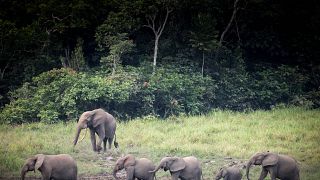Kenya
Elephants roam in Kimana Sanctuary.
Last year a large 180-acre farm near the Amboseli National Park, Kimana Sanctuary, and other conservation areas, was sold by local Maasai to KiliAvo Fresh, who fenced off the site and prepared it to plant avocados.
Conservationists and a group of local landowners, Amboseli Land Owners Conservancies Association, took their objections to National Environment Management Authority (NEMA), arguing that it disrupted a key migratory route for elephants and other wildlife and threatened to disrupt the local ecosystem.
NEMA ordered the suspension of work on the farm in September.
This week NEMA dismissed a case brought by KiliAvo Fresh to revoke that 'stop work' order, after seven months of hearings.
Benson Leyian is C.O.O. (Chief Operations Officer) of Big Life Foundation, an NGO that works with local communities to protect wildlife.
He welcomes the news and believes it will stop the same situation happening with other farms.
"The greatest danger of having this farm is that we set up precedents that there is another farm that will come up closer to the same," he says.
"The moment that corridor is closed you just count elephant extinction in Amboseli and most probably Kenya."
Cattle herding is an important part of the culture of the local Maasai people.
Avocado farms need a great deal of water. Experts say a mature avocado orchard uses almost twice as much water as a fairly dense forest, which could upset the delicate balance of the Amboseli ecosystem.
Samuel Kaanki is the head of the Amboseli Landowners Conservancies Association and a cattle farmer.
He says that if his people sell their land and invest in agriculture, their way of life will be lost forever.
"The Maasai are not good at crop farming. We are skilled at livestock keeping and if we stop it and venture into activities that we are not familiar it, we might lose our culture."
Kaanki and conservationists agree that investing in agriculture benefits a few, not the wider community.
"Crop farming will only benefit a few people. It will only benefit the rich farmers like KiliAvo who are billionaires. They can afford to purchase avocado seeds worth 20,000,000 Kenyan shillings (185,000 US dollars) unlike the Maasai who can barely afford to drill a borehole," he adds.
However, Jeremiah Salaash, a farm manager and shareholder at KiliAvo Fresh, speaking to the Associated Press before the most recent ruling, argues that the enterprise is providing employment for local people.
"We are employing more than 60 people. And those who are employed are benefiting from a good salary of around 15,000 (Kenyan Shillings, 139 US Dollars) per month," he says.
"It is not that we are against conservation. No. For us we are saying that we are not willing to be in conservation, we are going to do agriculture because our land is freehold land and it falls under agricultural land."
Salaash says the rewards of conservation are much less than agriculture for landowners.
"A parcel of 60 acres of land, a person per year is going to be paid around 20,000 (Kenyan shillings, 186 US Dollars) and you have a family. You want to educate your children, healthcare and other necessaries of human basic needs," he says.
"So if you do agriculture for any person or anybody who is a business-orientated person who knows the value of land, you can make a lot of money."
An agribusiness firm will lease an acre at sh 35,000 (324 US Dollars) for 6 months.
Therefore, for a 60 acre piece of land, the local landowners would pocket sh 4,200,000 (38,942 US Dollars) per annum.
However many people believe that it is important to put the interests of wildlife, the Maasai and the long-term economic benefits of tourism ahead of the short-term gains of agriculture.
Leyian says that the region is important for wildlife, livestock grazing and tourism, therefore supporting the livelihoods of many people.
"This corridor is very, very important and the ruling therein is very beneficial and important to all of us. Most importantly this is a well defined national wildlife corridor, not defined by people, but we have adapted because elephants have defined (it) that they will move from the Chyulu hills to Amboseli to Kilimanjaro National Park," he says.
"Secondly, it is important because it is a grass bank or refuge for dry season grazing areas for livestock and this is important for the local economy. Third is tourism. Tourism is picking up very well and we have a few investors within the area who are doing very well in tourism, COVID notwithstanding, and we have potential."
The conservationists and livestock farmers hope an important precedent has been set that protects wildlife and local culture in the face of agricultural expansion.
AP










11:19
Cocoa is under pressure while East African economy is on the rise {Business Africa}
02:30
Morocco’s oases struggle to survive amid growing desertification
01:26
Brazil elephant sanctuary welcomes its newest resident, rescued from a zoo in Argentina
01:45
Empowering youth in agriculture could boost global economy, FAO report says
02:22
Cameroonian marine conservationists trained as scientific divers
02:14
Scientists find way to identify elephant ivory disguised as legal mammoth ivory